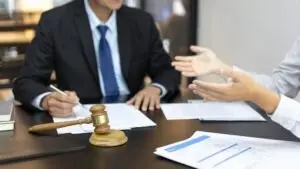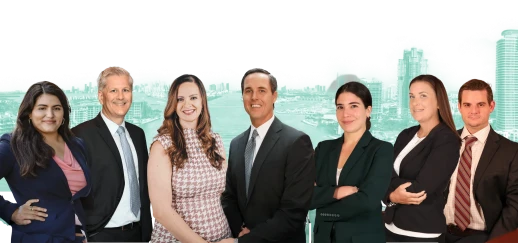
So, what evidence is required for a securities fraud case? In many cases, securities fraud lawyers look for financial statements, trading records, emails, and other forms of electronic communication. Witness testimony may also help.
Find out more about applicable evidence with our team at Viles & Beckman. Call or complete our online contact form to secure assistance now.
Securities Fraud Evidence: Financial Statements
When it comes to evidence crucial in a securities fraud case, the financial statements represent a key piece of evidence. These documents serve as vital proof of fraudulent activities.
Financial statements are essential in detecting misrepresentations or omissions, providing a clear picture of a company’s financial health and performance. They reveal important details such as:
- Revenue
- Expenses
- Liabilities
Going over these statements carefully can uncover deceitful practices, allowing your attorney to build your securities fraud case.


Expect More, Receive More: Legal Support That Feels Like Family
Securities Fraud Evidence: Trading Records
In addition to financial statements, trading records play a crucial role in establishing a securities fraud claim. These records include transaction logs and account statements, which are vital in tracking the movement of securities and identifying suspicious activities.
Trading records can reveal patterns of:
- Insider trading
- Market manipulation
- Unauthorized trades
Prosecutors can build a strong case against individuals or entities involved in securities fraud by carefully analyzing financial statements and trading records.
These documents can provide a clear picture of a company’s financial health and performance, detect misrepresentations or omissions, and track the movement of securities to identify suspicious activities.
Securities Fraud Evidence: Emails and Electronic Communications
Emails and other electronic communications are crucial in building a strong securities fraud case. These digital records provide valuable evidence of fraudulent activity, such as insider trading or misleading statements by executives.
Prosecutors and investigators analyze emails to establish a pattern of illegal behavior or uncover hidden transactions. They search for messages discussing:
- Non-public information
- Suspicious trading patterns
- Attempts to manipulate the market
Electronic communications also corroborate testimony from witnesses or whistleblowers. Obtaining all relevant emails and electronic communications during the investigation is essential to present a compelling case in court. Messages may reveal:
- Insider trading
- Misleading statements
- A pattern of illegal behavior or hidden transactions
Therefore, preserving and analyzing these digital records is vital for successful prosecution in securities fraud cases.
Securities Fraud Evidence: Witness Testimony
Witness testimonies are valuable in bringing the securities fraud case to life and establishing the facts and credibility of the case. There are two critical benefits of witness testimonies. They can:
Provide Direct Evidence
First, witness testimonies provide direct evidence of the fraudulent activities. Witnesses with firsthand knowledge can testify to the fraudulent actions they observed or were involved in. They can offer information about the following:
- Specific details
- Conversations
- Actions that took place
All of this information can be crucial in proving the case.
Show Motive and Intent
Second, witness testimonies help establish the intent and motive behind the fraud. Witnesses close to the individuals involved can shed light on their intentions, motivations, and any discussions or plans they may have had.
This testimony provides essential context for fraudulent activities and helps build a stronger case. Witness testimonies are instrumental in presenting a compelling case against the individuals involved in securities fraud.
Securities Fraud Evidence: Expert Analysis
Imagine the excitement of having an expert’s analysis and the power of forensic science to unravel the intricate web of deception in your situation involving securities misconduct.
Regarding securities fraud cases, expert analysis and forensic evidence are crucial in building a strong case. These professionals bring their specialized knowledge and skills to examine:
- Financial records
- Market trends
- Trading patterns
Their goal is to identify any irregularities or fraudulent activities. Through their analysis, experts provide valuable insights and opinions on the complex financial transactions involved. This expertise is essential in understanding the intricacies of securities fraud and presenting a compelling argument.
Securities Fraud Evidence: Forensic Evidence
In addition to expert analysis, forensic evidence plays a significant role in proving securities fraud. This evidence can include:
- Emails
- Documents
- Computer records
This evidence can provide concrete proof of fraudulent activities. By relying on this evidence, you can strengthen your case and increase your chances of successfully proving securities fraud.
How Do Lawyers Use Evidence in Securities Fraud Cases?
Lawyers utilize the evidence they gather in their securities fraud investigations to build strong claims for their clients. In many cases, lawyers focus on negotiating settlements on behalf of clients, striving to secure funds to cover any monies lost due to misconduct.
When Should You Gather Evidence for a Securities Fraud Case?
We recommend collecting any evidence possible about acts of securities fraud as you come upon it. You can also report suspected fraud to the Securities and Exchange Commission (SEC).
Reaching out to a lawyer when you discover the misconduct can make it easier for your legal team to collect evidence before the at-fault party destroys it.
Lawyers help you by working quickly to find and appropriately catalog evidence on your behalf, allowing you to feel confident about the outcome of your claim.
Speak to Us About Evidence for a Securities Fraud Claim
What evidence is needed for a securities fraud case? Lawyers may use everything from witness testimony to trading records and financial reports to build these claims. You can learn more about types of evidence with our team at Viles & Beckman.
Call or fill out our online contact form to begin the legal process.



